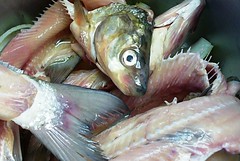
The Cookbook Writer as Food Anthropologist
I had the good fortune last week to spend the afternoon making gefilte fish with my former employer, the doyenne of Jewish food writing and an all-around great person, Joan Nathan. As the kitchen bustled with activity—the sputter of browning brisket and onions, the steady grinding of haddock, and the simmering of fish carcasses—I found myself thinking of the derided rise of cooking as spectator sport and the decline of home cooking. Nowhere is this trend more apparent than in food writing. In the past ten years, the great anthropological cookbooks of the 1960s and 1970s have been all but replaced by the fluffy side-projects of TV personalities, further alienating home cooks from their kitchens.
Joan and her generation of food writers had an entire world to discover. The work of Craig Claiborne, James Beard, Claudia Roden, Julia Child, Marcella Hazan, and Diana Kennedy introduced Americans to the great cuisines of the world, as well as many great regional cuisines of the United States. All of these food writers employed what one might call an anthropological or descriptivist approach to food writing. They visited home cooks and chefs in their kitchens, beat the pavement, and found recipes in dusty archives. Such cookbook authors still exist (Naomi Duguid and Jeffrey Alford, for example) but today the shelves of your local bookstore are dominated by what one might call the prescriptivist approach to writing cookbooks.
Whether written by celebrity chefs or Food Network stars, these books present a series of invented recipes, and thus prescribe how we should be cooking. Such books can be very helpful. But in the end, they privilege a single person’s vision (Bobby Flay’s approach to BBQ, Nigella Lawson’s take on Italian food, Jamie Oliver’s zest for life) over an entire culinary tradition. There’s nothing wrong with the prescriptivist approach. Without it we wouldn’t have masterpieces like the Chez Panisse Cookbook or Mark Bittman’s How to Cook Everything. But perhaps we could use a few more descriptivists out there, a new generation of food writer-cum-anthropologists combing the kitchens of the world and reporting back for the benefit of home cooks everywhere.

